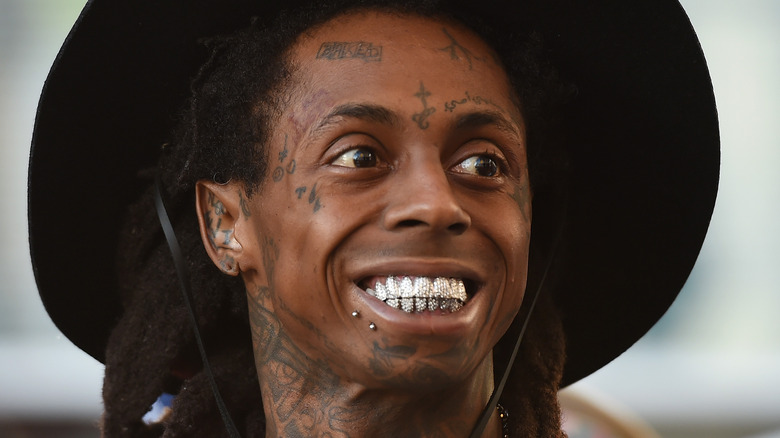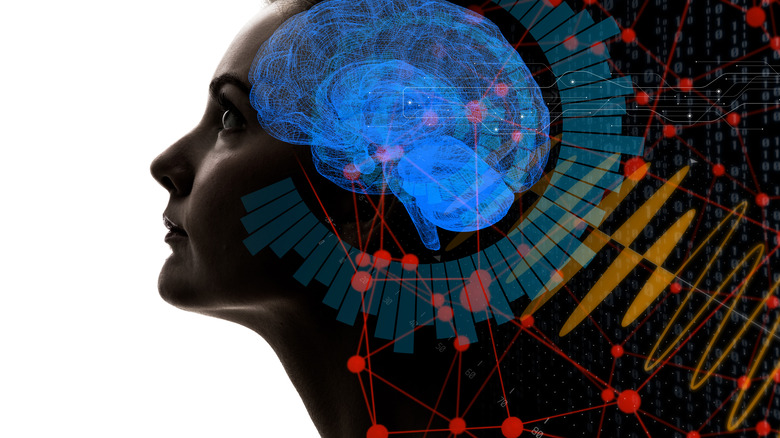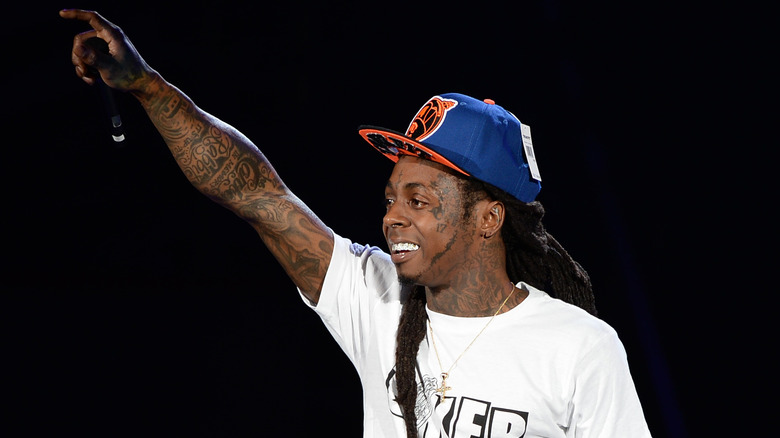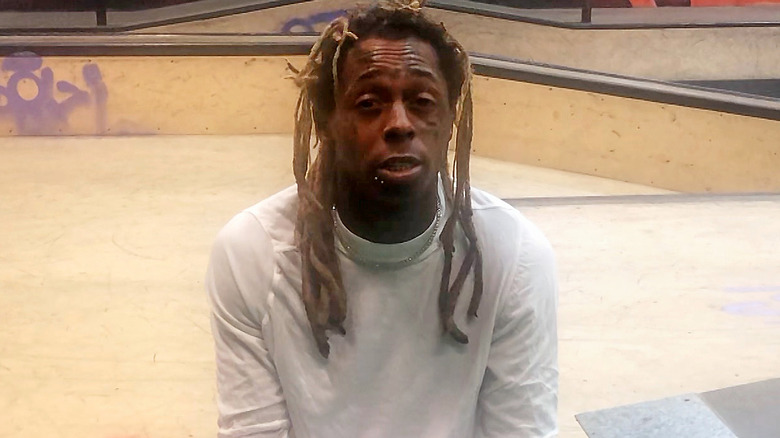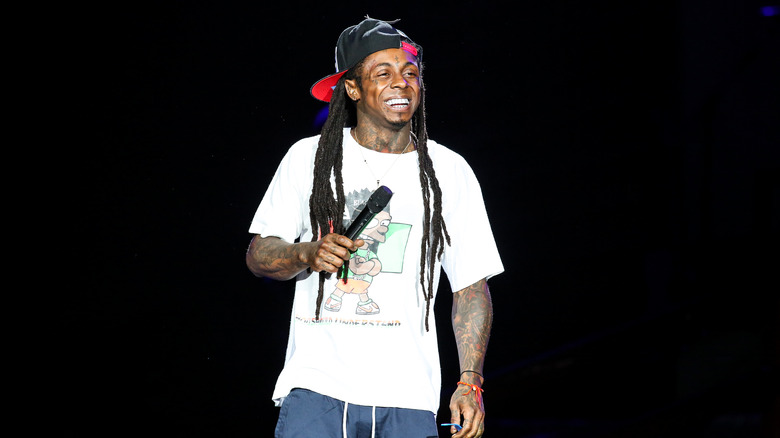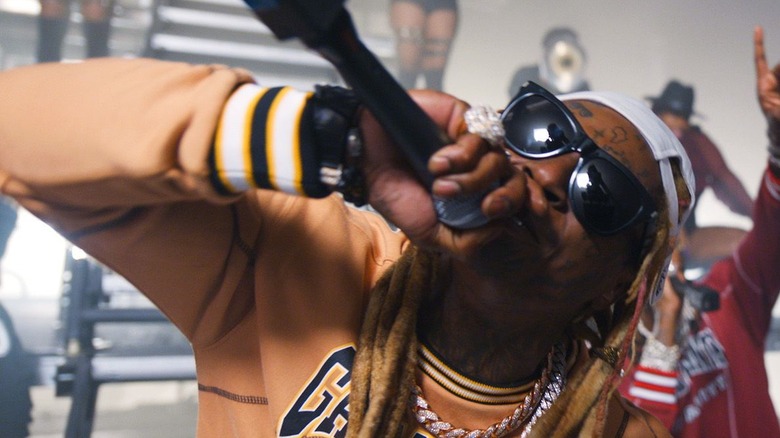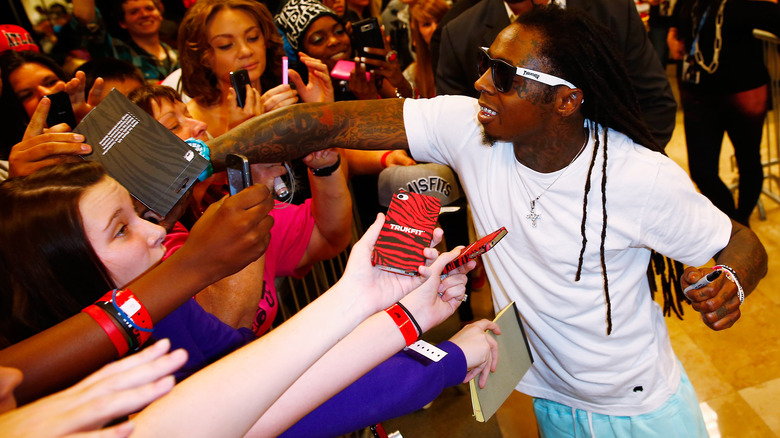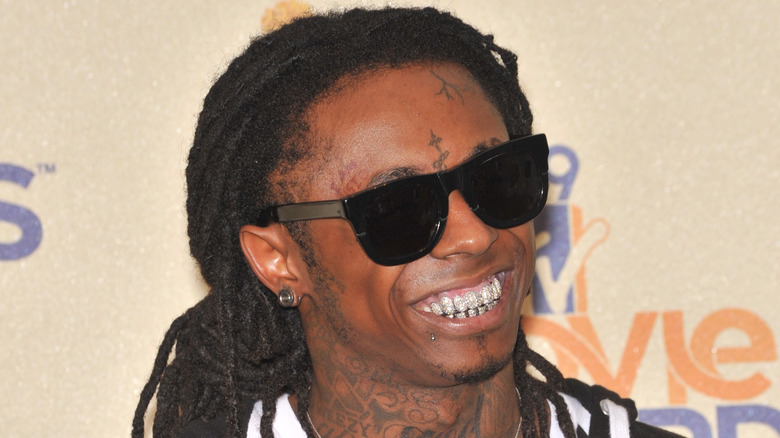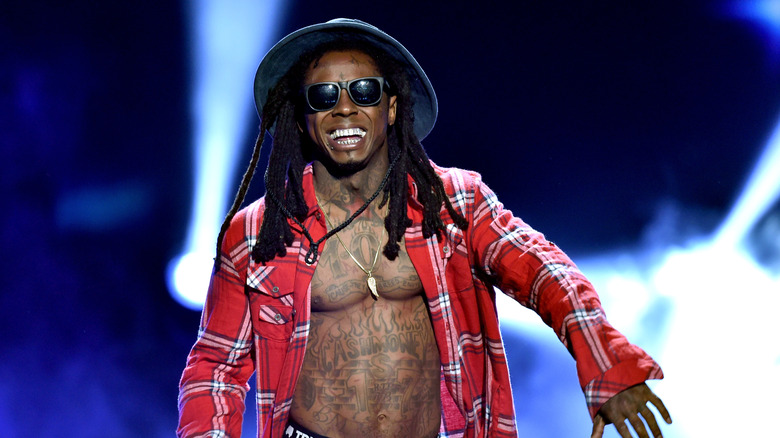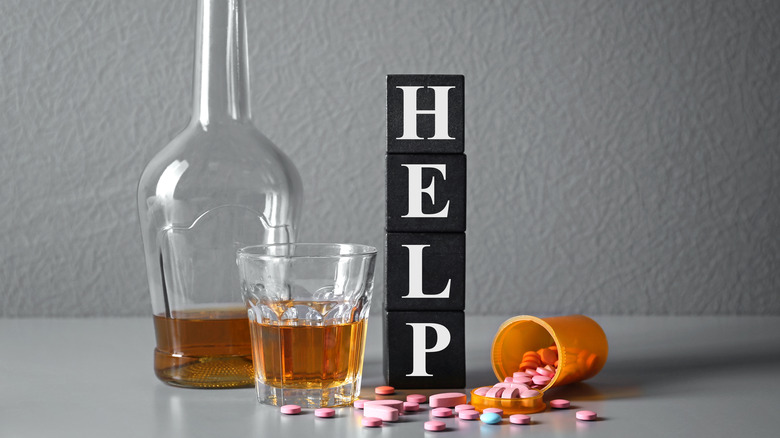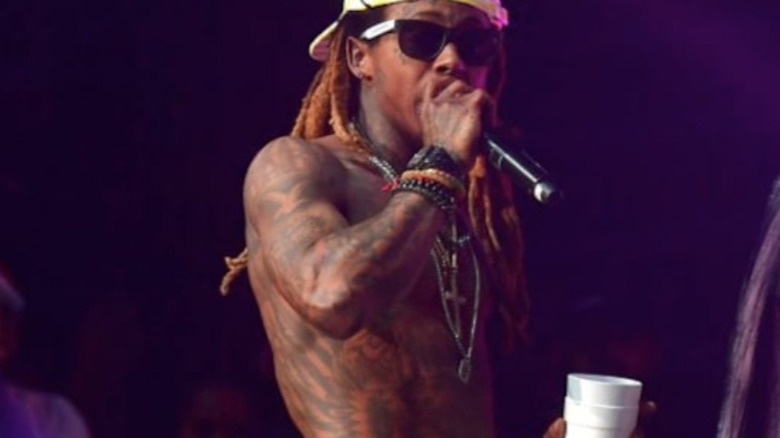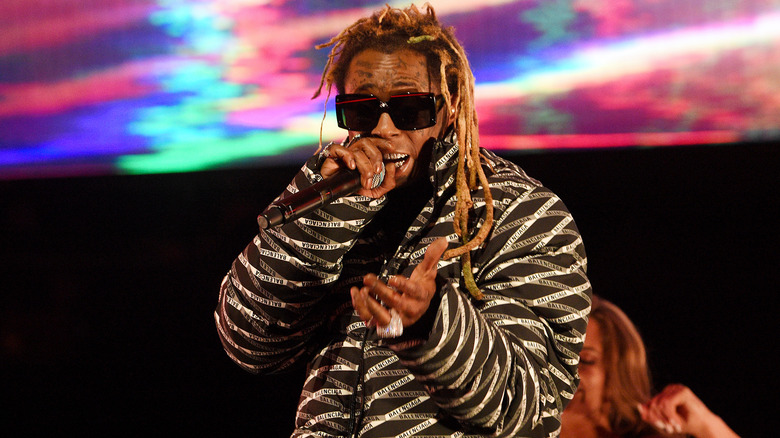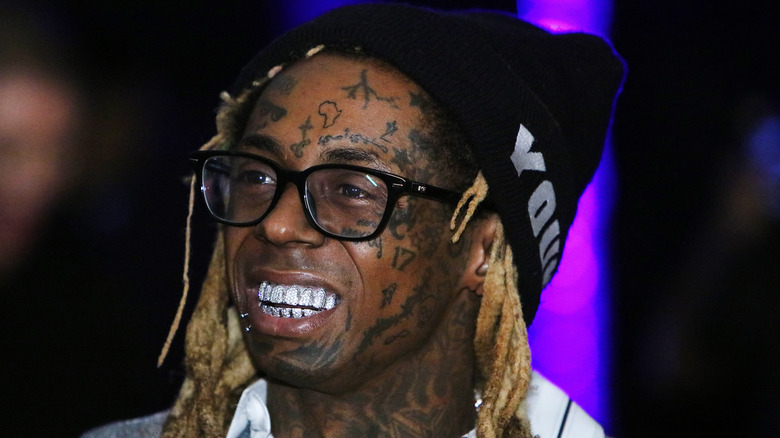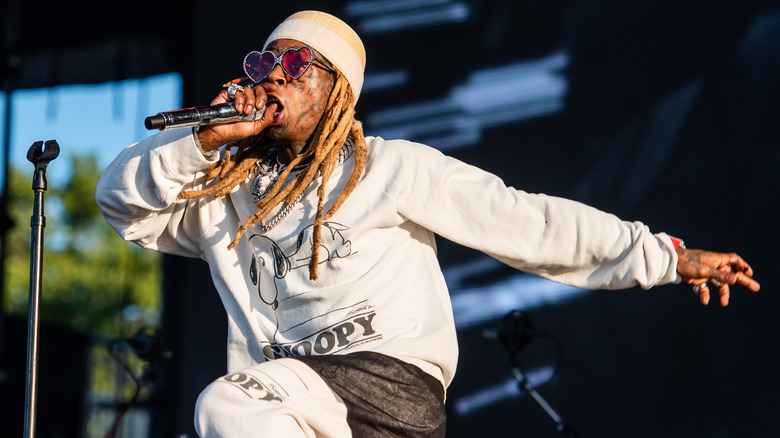Lil Wayne's History With Epilepsy Explained
Grammy Award-winning rapper Lil Wayne has been regarded as an "elder statesman in the rap game" for more than a decade now, as XXL Mag highlighted. Born Dwayne Michael Carter Jr. on September 27, 1982, in New Orleans, Louisiana, Lil Wayne was living in abject poverty in one of NOLA's most dangerous neighborhoods, Hollygrove, when he began rapping, which was sometime before he had turned eight (via Biography).
Within a few short years, "Weezy," as you may think of him, was already performing and recording music professionally. (His first recorded performance was with rapper B.G. on "True Stories," which dropped in 1993, the year Wayne turned 11.) None of that is to say, however, that in those days, young Lil Wayne was living anything close to a glamorous lifestyle.
He "dealt crack and once accidentally shot himself in the chest," Rolling Stone revealed in a 2008 profile of the rapper. Ten years later, he revealed to Billboard that it wasn't exactly an accident; Wayne had been attempting suicide after his mother forbid him to continue rapping. In 2013, the artist also revealed he'd been diagnosed with epilepsy during his childhood (via NPR). Let's take a look at Lil Wayne's history with the neurological disorder.
Epilepsy is an umbrella term for all seizure disorders
Some might think of epilepsy as a form of seizure disorder, but it's actually the umbrella term for all seizure disorders, according to the Epilepsy Foundation, which explains that a diagnosis of epilepsy will be made when someone experiences two unprovoked seizures not "caused by some known and reversible medical condition," such as alcohol withdrawal. The word itself doesn't speak to the cause of the seizures or their level of severity, both of which can vary significantly from person to person.
What a "seizure" refers to is an episode in which there is a "sudden surge of electrical activity in the brain," according to UPMC. This can cause various temporary bodily symptoms and conditions, including dizziness and/or passing out, nausea, heart palpitations, bradycardia, hot flashes, headaches, vision or hearing loss, and visual or auditory hallucinations (via Epilepsy Foundation). A seizure may be the result of a brain injury or illness, or it may also be simply the result of a family tendency. In many cases, the cause of epilepsy remains elusive. And the symptoms that a particular seizure manifests can vary, even from seizure to seizure in one person.
That's precisely how it is for Lil Wayne. Sometimes he may have a single seizure and then quickly recover (via USA Today). Other times, he'll experience multiple seizures over a short period of time. Some of his seizures have been mild, but others, life-threatening (via Rap-Up).
Although Lil Wayne has had epilepsy since childhood, he didn't know it was epilepsy until much later
Lil Wayne first began speaking publicly about his experience and history with epilepsy in 2013, despite that he had his first seizure as a young child (via Rap-Up). The reason was, as Wayne explained during an interview that year with Katie Couric, was a "lack of knowledge." At the time, Wayne's mother thought of the seizure as nothing more than a simple fainting spell. To Wayne's knowledge, he didn't have another seizure until he became an adult, although Wayne has stated that he is unaware of when he is having a seizure (via MTV).
It was only after Wayne was an adult seeking medical attention for seizures that Wayne came to recognize that his history with epilepsy went back at least as far as that very first fainting spell, which occurred when he was a very young child. This realization came about during a conversation Wayne had with his mother, during which he expressed his bafflement as to why he would be dealing with the "sudden" onset of epilepsy in adulthood. At that point, his mother reminded him about that "fainting spell," and the two realized that the episode may have been Lil Wayne's first in what would eventually become a long history of seizures.
Why it's difficult for Lil Wayne and his medical team to keep accurate track of his seizures
Because Lil Wayne wakes up from his seizures having no recollection of the event, it not only makes it difficult to pinpoint exactly at what point in his childhood his seizures may have begun. It also means that if he were to have a seizure with no one there to observe it, such as in his sleep, he wouldn't be able to report it to his medical team.
"I don't know that it happens," he told MTV's "RapFix Live" in May 2013 after being treated and released for a seizure a month earlier. "I mean, it's just a regular day. I go to sleep, I wake up in the hospital. I don't feel anything. I don't mind it, I just hope it stops happening." According to the Epilepsy Society of the UK, it isn't unusual for someone with epilepsy to experience memory deficits. "If you have lots of seizures, memory problems might happen more often," the organization explained.
In fact, seizures, themselves can adversely affect memory, both in general and of the episode itself. Epilepsy that affects, or is caused by abnormalities in, the temporal lobe of the brain, is most commonly associated with memory loss. However, Lil Wayne has not publicized the specific details of his epilepsy.
Lil Wayne spent almost a week in the hospital in 2013
Prior to 2013, Lil Wayne had never publicly addressed his history with epilepsy. When he did finally did, it was only after being hospitalized for six days as a result of multiple seizures. When he went public, he chose to give his story first to DJ Felli Fel of hip-hop station, Power 106 (via Rap-Up).
"The bad news is I'm an epileptic. I'm prone to seizures. This isn't my first, second, third, fourth, fifth, sixth, seventh seizure. I've had a bunch of seizures, ya'll just never hear about them," Wayne told Fel in the days after he returned home from his nearly-weeklong hospitalization. His stay included time in the intensive care unit (ICU) in connection with his seizures. Although Wayne hadn't revealed his diagnosis publicly until then, those close to him likely knew. Wayne explained that his seizures were frequent enough that anyone who's around him for any length of time eventually begins to "know what to do."
TMZ reported at the time that Wayne was in critical condition. What made this particular seizure episode so worrisome is that after having three seizures in a row, his heart rate dropped down to "like 30%" he told Fel. In addition, Wayne was living in a Los Angeles neighborhood that made a trip to the hospital logistically challenging. "I live in the hills in L.A. ... I live all the way at the top, so you know how hard it is getting down those hills. That was what was so scary about it."
Lil Wayne experienced another seizure after being released from the hospital
Just weeks after an episode involving multiple seizures landed Lil Wayne in intensive care in March 2013, Lil Wayne experienced yet another seizure, according to TMZ. On April 30, 2013, Lil Wayne was taken to Cedars-Sinai Medical Center in Los Angeles after experiencing an isolated seizure. This one appears to have been less medically worrisome than the seizures Wayne had in March, however. Whereas Lil Wayne's previous hospitalization had lasted for six days and involved multiple seizures, this time Lil Wayne was deemed to be in good enough shape to be released within 24 hours.
The next morning, the rapper reassured his fans, tweeting, "I'm fine. Thank u." A few days later, Weezy again spoke publicly about his history of epilepsy with MTV News' "RapFix Live," revealing that his seizures are as shocking to him as they are to his fans (via USA Today). "I go to sleep and wake up in the hospital," and while sometimes there's a headache that might give him a clue as to the possibility that he may have a seizure, that was not the case this time. "The headaches? I didn't get no headaches or nothing," he explained.
You might recall older reports of Lil Wayne's 'seizure-like symptoms'
It wasn't until March 2013 that Lil Wayne publicly divulged — for the first time ever — that he had been diagnosed with epilepsy. However, looking back, it appears that the first hints that Lil Wayne may have had a history with the neurological condition were visible in 2012. That was when it was first reported that Wayne had possibly experienced a seizure, although the word "epilepsy" was not mentioned at the time. Specifically, in October 2012, TMZ reported that a private jet transporting Lil Wayne had to make an emergency landing in Texas after the rapper experienced "seizure-like symptoms" mid-flight.
Wayne was briefly hospitalized for treatment. After leaving the hospital and getting back to the business of his day, Wayne experienced another seizure and was sent to another hospital, this time in Louisiana, according to a separate report by TMZ. Although a rep for Lil Wayne allegedly said that Wayne was dealing with was a migraine and dehydration, this wasn't consistent with the pilot's report and hospital accounts.
Lil Wayne experienced at least three seizures during summer 2016
In June 2016, Lil Wayne once again experienced a seizure while flying as a passenger on a small private plane. According to TMZ, Lil Wayne was on a cross-country flight that took off from Milwaukee, Wisconsin and was en route to California. Wayne's plane never did land in California, however, because Wayne experienced a seizure somewhere over Nebraska. Wayne apparently lost consciousness as a result. The pilot made an emergency landing in order to get Wayne medical treatment before continuing on to California.
After the plane landed in Omaha, Nebraska, Wayne refused medical treatment. However, Wayne later confirmed that he'd had an epileptic seizure (via Hip Hop DX). Not more than an hour later, while flying out of Omaha, Lil Wayne had another seizure, forcing the plane to turn around and make an emergency landing back in Omaha. TMZ reported Wayne was then treated by paramedics on the aircraft.
Just one month later, Lil Wayne experienced another seizure — this time mere moments before he was due to take the stage at TAO nightclub in Las Vegas, Nevada during the second weekend of July, TMZ reported in 2016. This seizure was apparently more serious because not only did it lead to the cancellation of the show, but he also was reportedly hospitalized in the ICU.
Lil Wayne missed a show in Las Vegas in 2017 after having two seizures in Chicago
In September 2017, TMZ reported that Lil Wayne had been hospitalized again in connection with his epilepsy. "Multiple sources tell us Wayne was hospitalized Sunday in Chicago after he was found unconscious in his hotel room at the Westin on Michigan Avenue after suffering at least one seizure," TMZ alleged. "He was rushed to Northwestern Memorial, where we're told he suffered yet another seizure." These incidents were confirmed by the Chicago Fire Department (via Chicago Tribune).
According to Variety, it appears Lil Wayne had left the hospital by Monday morning, which would tend to imply that this particular episode of seizures was not as serious as others he'd had in the past. Nevertheless, as a result of these two seizures, Lil Wayne was forced to cancel another show scheduled in Las Vegas, Nevada, this one at Drai's Nightclub. Wayne's medical team believed that it was too risky for Wayne to attempt to fly to Vegas, given that he had a history of experiencing seizures while traveling by air (via TMZ).
Did 'sizzurp' contribute to Lil Wayne's propensity toward seizures?
Ever since the public first learned about Lil Wayne's epilepsy diagnosis, there has been on-and-off speculation as to whether the star's lifestyle might have contributed to his seizures (via MTV). Wayne acknowledged the rumors in a September 2013 interview with Katie Couric.
During the sitdown, Couric expressed concern to Wayne about his consumption of "sizzurp" (sometimes called "lean" or "double cupping"). Sizzurp is a liquid concoction containing codeine and soda (via Partnership to End Addiction). Wayne told Couric that he had stopped imbibing "the syrup," as Couric referred to it. However, he opened up about the fact that he had been taking "pain pills" that contained codeine. "So the lack of drinking the codeine the way I did drink it ... it was kind of like a reaction of you stopping the drug," he explained.
According to Dr. Michael Privitera, a professor and the director of the Epilepsy Center at the University of Cincinnati Neuroscience Institute, told MTV that there are multiple reasons that can contribute to epilepsy, including genetics or taking codeine.
If you or anyone you know is struggling with addiction issues, help is available. Visit the Substance Abuse and Mental Health Services Administration website or contact SAMHSA's National Helpline at 1-800-662-HELP (4357).
Lil Wayne said that he stopped using codeine at the advice of his doctors
A few months after Lil Wayne went public with his epilepsy diagnosis back in 2013, Katie Couric asked him if he was still using codeine. Lil Wayne replied that he "can't" because the doctors told him it was off-limits due to his history with epilepsy. Since then, when Wayne has had seizures that the public has learned about, Wayne has attributed them to many things, including dehydration, stress, lack of sleep, and overworking (via Rap-Up) but he has never admitted to, and at times had denied, continuing to abuse codeine.
Still, some continue to speculate that Wayne's seizures in recent years have been caused, or at least, exacerbated by his use of cough syrup, including TMZ, which in 2017 published a series of photos taken of Lil Wayne in which Wayne is hoisting a "double cup," which is culturally associated with sizzurp (via TMZ). "Lil Wayne continues playing with fire by downing sizzurp, and there's plenty of visual evidence he's been doing it regularly for months leading up to his latest seizure," TMZ alleged in the accompanying story.
That said, Lil Wayne holds no ill will against the site. "That's what they do," the rapper told DJ Felli Fel (via Rap-Up). "I can't be upset at TMZ for doing what they do," he continued.
Lil Wayne doesn't always see his condition as a 'life-changing thing'
Epilepsy is a serious neurological disorder, according to the Mayo Clinic. However, Lil Wayne hasn't always been forthright about the seriousness of his condition. Wayne and his representatives have been known to post reassuring messages on Twitter after the media reports on a seizure episode. For example, in 2016, after he cancelled a Vegas show following a backstage seizure, Wayne tweeted the next day that this was nothing more than a "false alarm" (via Hip Hop DX).
"I appreciate da prayers and konsern, but I'm good," he added. It may be that he doesn't want his fan to worry about him, or that he wishes to circumvent any further discussion about his history with epilepsy. "I don't mean to sound bad, but it wasn't no life-changing thing," he told the magazine Nylon-Guys in late 2014 regarding the seizures he had in 2013 that exposed his epilepsy to the public eye (via Rap-Up). "I shot myself when I was 12. I grew up in Hollygrove [in New Orleans, Louisiana]. I've seen way worse."
However, the rapper did admit the seriousness of his seizures after his nearly week-long hospital stay in 2013. "Basically, I could've died, so that is why it was so serious," he said (via Rap-Up).
Lil Wayne manages his epilepsy with medication
Lil Wayne seldom speaks publicly about the manner in which he and his medical team are managing his epilepsy. What we do know, however, is that after experiencing seizures in 2012 (which Wayne's camp initially attributed to a migraine and dehydration), Wayne said that he "didn't want to make a big deal about the whole thing," but that his "recovery regimen includes seizure medication and plenty of water," according to MTV. He also said that he was under doctors' orders to drink "four bottles of water a day," adding, "I ain't drinking four water bottles, but everything's good."
The following year, when Weezy went public with his epilepsy diagnosis, he spoke about the advice his doctor had given him. "He didn't tell me to do too much that a human, that we all don't do anyway," Lil Wayne said. "Sleep and eat right — that's about it" (via MTV). And in 2020, he told a Florida judge that he was "taking daily medication for his epilepsy," according to Tampa Bay Times.
As a celebrity with epilepsy, Lil Wayne is in esteemed company
If Lil Wayne is reluctant to share with the general public the details of his history with epilepsy, it may be because people with epilepsy can feel stigmatized by their condition, as reflected in a 2002 research paper published in the journal of Epilepsy & Behavior. "Though attitudes toward people with epilepsy have improved over the years, for many people with epilepsy, stigma continues to adversely impact their psychological well-being and quality of life," the paper's author wrote. "The stigma of epilepsy can be linked to a number of factors, including under-resourced medical services, poor seizure control, and inadequate knowledge of epilepsy."
Nevertheless, Lil Wayne, who has gone out of his way to reassure his fans that his epilepsy will not interfere with his career, is in good company as there are a number of famous people who are known to have had epilepsy. For example, the 26th President of the U.S., Theodore Roosevelt, contended with epilepsy, according to Healthline. Sadly, Roosevelt felt compelled to downplay his condition as a result of the stigma attached.
The Academy Award-winning actor Danny Glover is another famous and much-admired person who has a history of epilepsy, which began when he was a child. So too is the celebrated singer-songwriter Neil Young, who also has a daughter with the condition. Young wrote about his epilepsy in his memoir, "Waging Heavy Peace" (via Healthline).

